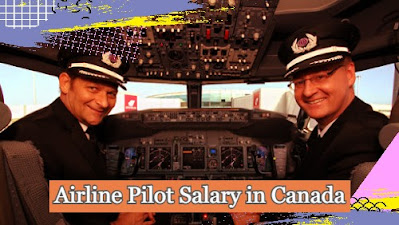How Much Does a Airline Pilot Make in Canada (2021)
How Much Money Do Airline Pilots Make? Airline Pilot: Key Features, The Work, Yearly Salary in Canada (2021), Prospects
What do airline pilots do?
Airline Pilots carry out a variety of tasks. Although most pilots fly passenger and cargo planes, many others perform tasks such as crop dusting, inspecting power lines, and taking photographs. Except on small planes, a pilot and copilot usually fly the plane with the pilot (captain) in overall command. The copilot helps communicate with air traffic controllers, monitor the instruments, and fly the plane. Most large airliners also have a third pilot, called the flight engineer, who monitors and operates many of the instruments and watches for other aircraft.
How to become a airline pilot?
Recent college graduates with experience flying jet aircraft, a commercial pilot’s license, and a flight engineer’s license usually get first consideration with major airlines. Businesses that operate private aircraft generally have fewer formal education and experience requirements than airlines; these companies usually prefer applicants with experience in the type of plane they will be flying on the job.
Airline Pilot Salary in Canada
Despite the expected long term growth in this field, even highly qualified career changers may find it hard to get entry level positions. The income advancement for those who do enter the field is high. Annual income of pilots ranges from about $65,000 a year for copilots on small, business owned aircraft to as much as $140,000 or more for a senior airline pilot.
The average salary for a Airline Pilot in Canada (2021)
Annual Salary $128,800
Monthly Salary $10,650
Weekly Salary $2,650
Hourly Salary $59
Airline Pilot Requirements in Canada
Entry Requirements in Prior Experience:
There are exacting requirements for prior flying experience set by the Transport Canada Civil Aviation (TCCA) for each of the licenses it issues pilots. For example, all pilots who are paid to transport passengers or cargo must have at least a commercial pilot’s license from the TCCA. In addition to other qualifications, applicants must have logged at least 250 hours of flying experience. Airline pilots who are captains have a much higher flight time requirement. They must have logged at least 1,500 hours, including night and instrument flying.
Entry Requirements in Personal Qualities:
Good physical condition is one of the most important qualifications for this line of work. In addition to having the necessary coordination and good reflexes necessary to fly an airplane, commercial pilots must be able to pass a strict physical examination. They must be in good health, have 20/20 vision with or without glasses, good hearing and no physical handicaps that could impair their performance. Although flying does not involve much physical effort, the mental stress of being responsible for a safe flight can be very tiring. Particularly during takeoffand landing, pilots must be alert and ready to act if something goes wrong. Airline companies give all applicants for positions as pilots psychological tests to be sure that they are able to make quick decisions and accurate judgments under pressure.
Entry Requirements in Training and Education:
Career changers in this field will have to meet demanding requirements set by the Transport Canada Civil Aviation (TCCA). All paid cargo and passenger transport pilots must have at least an TCCA commercial pilot’s license. In addition to passing a physical examination, applicants must have sufficient flying time, pass a written test on flying skills, knowledge and regulations, and successfully complete an in flight test of their skills. In addition to having this license, pilots who have to fly in bad weather must be licensed to fly by instruments. They must have 40 hours of flight time on instruments, pass a written test, and demonstrate their ability to fly by instruments.
Pilot Salary in Canada - Airline Pilot Pay
Airline pilots must fulfill still other requirements. They must pass a written test and flight examination to earn a flight engineer’s license. Captains must also have an airline transport pilot’s license, for which they must have logged at least 1,500 hours of flying time.
Although airline pilots must be high school graduates, most airlines require two years of college. They usually prefer applicants with four year college degrees.
Related Articles:











Comments
Post a Comment